A doksi online olvasásához kérlek jelentkezz be!
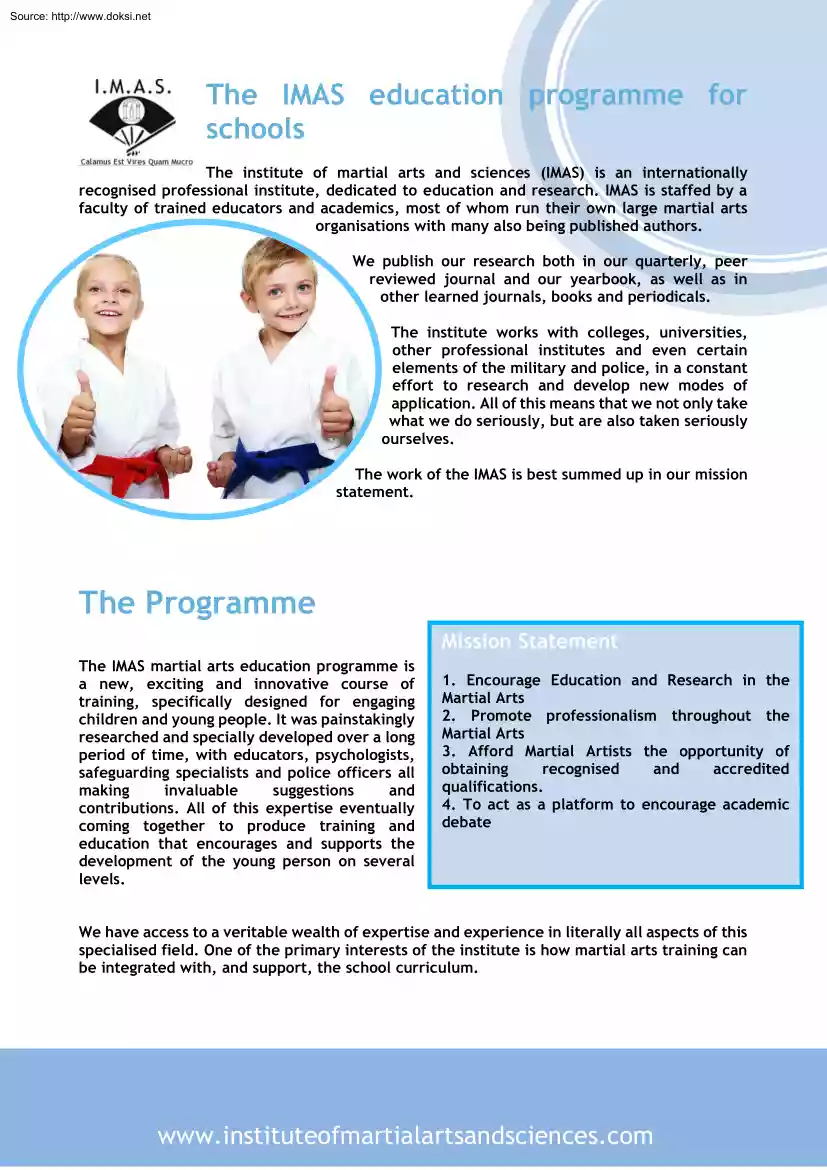
A doksi online olvasásához kérlek jelentkezz be!
Nincs még értékelés. Legyél Te az első!
Mit olvastak a többiek, ha ezzel végeztek?
Tartalmi kivonat
Source: http://www.doksinet The IMAS education programme for schools The institute of martial arts and sciences (IMAS) is an internationally recognised professional institute, dedicated to education and research. IMAS is staffed by a faculty of trained educators and academics, most of whom run their own large martial arts organisations with many also being published authors. We publish our research both in our quarterly, peer reviewed journal and our yearbook, as well as in other learned journals, books and periodicals. The institute works with colleges, universities, other professional institutes and even certain elements of the military and police, in a constant effort to research and develop new modes of application. All of this means that we not only take what we do seriously, but are also taken seriously ourselves. The work of the IMAS is best summed up in our mission statement. The Programme Mission Statement The IMAS martial arts education programme is a new, exciting and
innovative course of training, specifically designed for engaging children and young people. It was painstakingly researched and specially developed over a long period of time, with educators, psychologists, safeguarding specialists and police officers all making invaluable suggestions and contributions. All of this expertise eventually coming together to produce training and education that encourages and supports the development of the young person on several levels. 1. Encourage Education and Research in the Martial Arts 2. Promote professionalism throughout the Martial Arts 3. Afford Martial Artists the opportunity of obtaining recognised and accredited qualifications. 4. To act as a platform to encourage academic debate We have access to a veritable wealth of expertise and experience in literally all aspects of this specialised field. One of the primary interests of the institute is how martial arts training can be integrated with, and support, the school curriculum.
www.instituteofmartialartsandsciencescom Source: http://www.doksinet Why martial arts training? There are several positive and important reasons for children and young people to engage in regular, safe and properly taught martial arts classes: 1. There is widespread concern regarding children and young people becoming increasingly inactive and unhealthy Inactive and unhealthy lifestyles can lead to serious health issues later on in life such as diabetes, high blood pressure etc, as well as certain psychological conditions. Regular martial arts training has been shown to help people become far more fit, healthy and active, both physically and mentally, making them stronger and well balanced individuals 2. OFSTED have recently highlighted that in many schools there was a particular weakness around the use of assessment in Physical Education. The report identified a lack of clarity regarding what progress should look like and, with the removal of the National Curriculum levels, it
has become increasingly difficult for teachers to be confident in their assessments. The IMAS martial arts education programme utilises the universally accepted coloured belt system in order to mark progress and monitor performance. This tried and tested method is an extremely effective benchmark when it comes to assessment, as each coloured belt has it's very own set of learning outcomes and assessment criteria attached to it. These learning outcomes must be realised prior to examination, where the pupils knowledge, skills and attitudes will all be tested. In keeping with modern educational practice, we use a variety of teaching and assessment methodologies. This practice also falls in line with the institute’s policy regarding equality, diversity and inclusion: We believe in catering for the needs of the individual and accept that "one size does not fit all". Thanks to the flexibility of our syllabus and the excellent training of our instructors, we can modify and
adapt what we do to all kinds of individuals, groups and environments. Source: http://www.doksinet 3. We need to ensure we do everything in our power to keep children and young people as safe and secure as possible. The IMAS martial arts education programme has elements of personal safety and security purposely and deliberately embedded within its scheme of work for this very reason. With the steady increase of crime, and the police service already being over stretched, it is absolutely essential that we teach our youngsters about these vital skills. Therefore, as well as the more traditional martial arts techniques, pupils are also taught: Observation and awareness Recording and reporting an incident Threat and risk assessment Assertiveness Anti-bullying (including online safety) Where to find help and support Simple self defence techniques IMAS supported recently provided training for a Manchester high school that chose to concentrate upon ‘Personal safety and security’ for
pupils undergoing the Duke of Edinburgh Award scheme. 4. Society seems worried about how young people behave. Our special programme is designed to encourage politeness, discipline and good manners. From the very beginning, pupils are informed exactly what is expected of them, and how their behaviour is even more important to them being able to advance than any of the techniques they learn. This is done in a firm but gentle way, allowing the individual to reach their own conclusions and make their own decisions about the speed of their growth as a martial artist. This makes for a polite, well-mannered and well balanced person who understands the consequences of their actions and the importance of appropriate behaviour. We know this approach works, as it has proven extremely successful with pupils with recognised special educational needs and those displaying challenging behaviour. 5. Not all children and young people want to compete While there are, indeed, sporting aspects to what we
do, and plenty of opportunities to compete in these, the IMAS martial arts education programme tends to concentrate its efforts upon helping the pupil to grow and realise their full potential. Therefore, if a pupil is of a sporting nature, and enjoys competing, then they can, but, if they just want to train hard and work at being the best they can be, then that's fine as well. Our programme is open and accessible to everyone and they can take from it whatever they want or need to realise their own personal goals. Our training is about building strong, confident individuals, helping them Source: http://www.doksinet to develop physically, intellectually, emotionally and socially, instilling within them a strong sense of self-worth. That way, they all become champions Whenever possible, we try to link our classes to certain subjects included in the National curriculum, so it is possible to observe certain aspects of the physical and social sciences, history, geography and even
(when and where appropriate) philosophy included in our classes. The problem-solving and group work aspects of our syllabus support young people developing skills that are transferable to both academic and social success. In this way, pupils can begin to appreciate the universality of knowledge and even, perhaps, enjoy the process of learning a lot more. That is the answer to the question "why martial arts?" Martial arts are a lot different to other sports and pastimes: they are a way of life that changes lives. Instructors All IMAS instructors are properly trained and qualified. They must first meet, and then maintain, the high standards the institute expects of any individual wishing to remain upon our register, including undergoing and recording regular CPD activities. An IMAS registered instructor is trained and qualified in the following: High level of technical competence Teaching, learning and assessment Special Educational Needs Safeguarding and child protection
Equality, diversity and inclusion Health and safety First aid They also all possess a current DBS (enhanced) and special instructors insurance. Many hold other qualifications above and beyond their IMAS ones, with most being educated to degree level. The IMAS martial arts education programme can be used as a tool for positive change, enhancing education and enriching lives. It has good, hard, measurable outcomes, as has already been mentioned above, but it is the many soft outcomes such as increased levels of confidence and self-esteem, improved interpersonal skills, discipline, respect for authority and the ability to work as an effective part of a team, etc., that truly define it It is all these that truly make the most profound and long lasting contribution to a pupil’s development and wellbeing. Source: http://www.doksinet Enhancement and Enrichment activities Pupils learning experiences are regularly enhanced by such strategies as having occasional access to different types
of equipment and visits by suitably qualified, vetted and insured guest instructors, and access to certain relevant publications, websites and audio/visual resources. Enrichment activities might include visits to other clubs, attending special courses or even a trip to a local museum to examine relevant exhibits, etc The IMAS Education Programme for Schools: Structured training, developing stronger people For more information about us, visit our website: www.instituteofmartialartsandsciencescom For further information on the IMAS Education programme for schools, contact: admin@instituteofmartialartsandsciences.com
innovative course of training, specifically designed for engaging children and young people. It was painstakingly researched and specially developed over a long period of time, with educators, psychologists, safeguarding specialists and police officers all making invaluable suggestions and contributions. All of this expertise eventually coming together to produce training and education that encourages and supports the development of the young person on several levels. 1. Encourage Education and Research in the Martial Arts 2. Promote professionalism throughout the Martial Arts 3. Afford Martial Artists the opportunity of obtaining recognised and accredited qualifications. 4. To act as a platform to encourage academic debate We have access to a veritable wealth of expertise and experience in literally all aspects of this specialised field. One of the primary interests of the institute is how martial arts training can be integrated with, and support, the school curriculum.
www.instituteofmartialartsandsciencescom Source: http://www.doksinet Why martial arts training? There are several positive and important reasons for children and young people to engage in regular, safe and properly taught martial arts classes: 1. There is widespread concern regarding children and young people becoming increasingly inactive and unhealthy Inactive and unhealthy lifestyles can lead to serious health issues later on in life such as diabetes, high blood pressure etc, as well as certain psychological conditions. Regular martial arts training has been shown to help people become far more fit, healthy and active, both physically and mentally, making them stronger and well balanced individuals 2. OFSTED have recently highlighted that in many schools there was a particular weakness around the use of assessment in Physical Education. The report identified a lack of clarity regarding what progress should look like and, with the removal of the National Curriculum levels, it
has become increasingly difficult for teachers to be confident in their assessments. The IMAS martial arts education programme utilises the universally accepted coloured belt system in order to mark progress and monitor performance. This tried and tested method is an extremely effective benchmark when it comes to assessment, as each coloured belt has it's very own set of learning outcomes and assessment criteria attached to it. These learning outcomes must be realised prior to examination, where the pupils knowledge, skills and attitudes will all be tested. In keeping with modern educational practice, we use a variety of teaching and assessment methodologies. This practice also falls in line with the institute’s policy regarding equality, diversity and inclusion: We believe in catering for the needs of the individual and accept that "one size does not fit all". Thanks to the flexibility of our syllabus and the excellent training of our instructors, we can modify and
adapt what we do to all kinds of individuals, groups and environments. Source: http://www.doksinet 3. We need to ensure we do everything in our power to keep children and young people as safe and secure as possible. The IMAS martial arts education programme has elements of personal safety and security purposely and deliberately embedded within its scheme of work for this very reason. With the steady increase of crime, and the police service already being over stretched, it is absolutely essential that we teach our youngsters about these vital skills. Therefore, as well as the more traditional martial arts techniques, pupils are also taught: Observation and awareness Recording and reporting an incident Threat and risk assessment Assertiveness Anti-bullying (including online safety) Where to find help and support Simple self defence techniques IMAS supported recently provided training for a Manchester high school that chose to concentrate upon ‘Personal safety and security’ for
pupils undergoing the Duke of Edinburgh Award scheme. 4. Society seems worried about how young people behave. Our special programme is designed to encourage politeness, discipline and good manners. From the very beginning, pupils are informed exactly what is expected of them, and how their behaviour is even more important to them being able to advance than any of the techniques they learn. This is done in a firm but gentle way, allowing the individual to reach their own conclusions and make their own decisions about the speed of their growth as a martial artist. This makes for a polite, well-mannered and well balanced person who understands the consequences of their actions and the importance of appropriate behaviour. We know this approach works, as it has proven extremely successful with pupils with recognised special educational needs and those displaying challenging behaviour. 5. Not all children and young people want to compete While there are, indeed, sporting aspects to what we
do, and plenty of opportunities to compete in these, the IMAS martial arts education programme tends to concentrate its efforts upon helping the pupil to grow and realise their full potential. Therefore, if a pupil is of a sporting nature, and enjoys competing, then they can, but, if they just want to train hard and work at being the best they can be, then that's fine as well. Our programme is open and accessible to everyone and they can take from it whatever they want or need to realise their own personal goals. Our training is about building strong, confident individuals, helping them Source: http://www.doksinet to develop physically, intellectually, emotionally and socially, instilling within them a strong sense of self-worth. That way, they all become champions Whenever possible, we try to link our classes to certain subjects included in the National curriculum, so it is possible to observe certain aspects of the physical and social sciences, history, geography and even
(when and where appropriate) philosophy included in our classes. The problem-solving and group work aspects of our syllabus support young people developing skills that are transferable to both academic and social success. In this way, pupils can begin to appreciate the universality of knowledge and even, perhaps, enjoy the process of learning a lot more. That is the answer to the question "why martial arts?" Martial arts are a lot different to other sports and pastimes: they are a way of life that changes lives. Instructors All IMAS instructors are properly trained and qualified. They must first meet, and then maintain, the high standards the institute expects of any individual wishing to remain upon our register, including undergoing and recording regular CPD activities. An IMAS registered instructor is trained and qualified in the following: High level of technical competence Teaching, learning and assessment Special Educational Needs Safeguarding and child protection
Equality, diversity and inclusion Health and safety First aid They also all possess a current DBS (enhanced) and special instructors insurance. Many hold other qualifications above and beyond their IMAS ones, with most being educated to degree level. The IMAS martial arts education programme can be used as a tool for positive change, enhancing education and enriching lives. It has good, hard, measurable outcomes, as has already been mentioned above, but it is the many soft outcomes such as increased levels of confidence and self-esteem, improved interpersonal skills, discipline, respect for authority and the ability to work as an effective part of a team, etc., that truly define it It is all these that truly make the most profound and long lasting contribution to a pupil’s development and wellbeing. Source: http://www.doksinet Enhancement and Enrichment activities Pupils learning experiences are regularly enhanced by such strategies as having occasional access to different types
of equipment and visits by suitably qualified, vetted and insured guest instructors, and access to certain relevant publications, websites and audio/visual resources. Enrichment activities might include visits to other clubs, attending special courses or even a trip to a local museum to examine relevant exhibits, etc The IMAS Education Programme for Schools: Structured training, developing stronger people For more information about us, visit our website: www.instituteofmartialartsandsciencescom For further information on the IMAS Education programme for schools, contact: admin@instituteofmartialartsandsciences.com
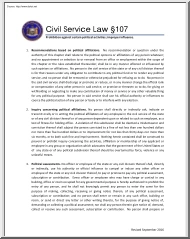
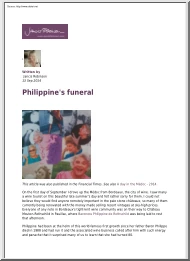
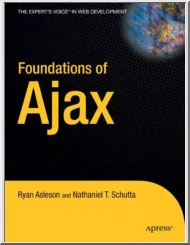
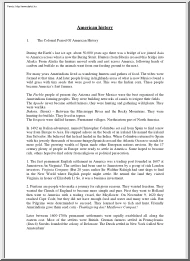
 Jellemzően a vállalkozás beindítása előtt elkészített tanulmány, de készülhet már meglévő vállalkozás esetében is. Az üzleti tervezés egy olyan tervezési módszer, amely keretet a cég céljainak eléréséhez. Írásunk módszertani útmutatóként szolgál azoknak, akik érdeklődnek az üzleti tervezés iránt.
Jellemzően a vállalkozás beindítása előtt elkészített tanulmány, de készülhet már meglévő vállalkozás esetében is. Az üzleti tervezés egy olyan tervezési módszer, amely keretet a cég céljainak eléréséhez. Írásunk módszertani útmutatóként szolgál azoknak, akik érdeklődnek az üzleti tervezés iránt.